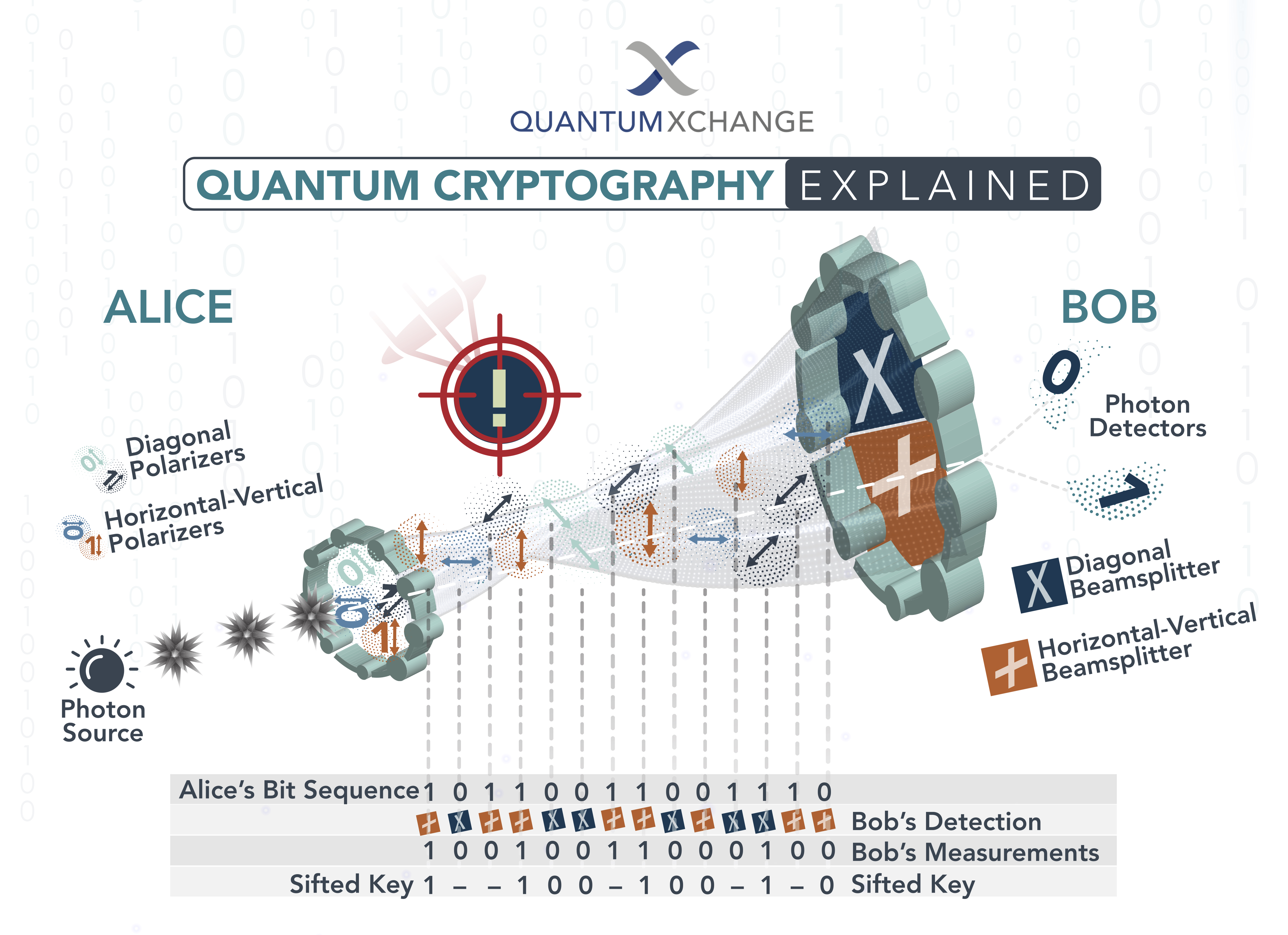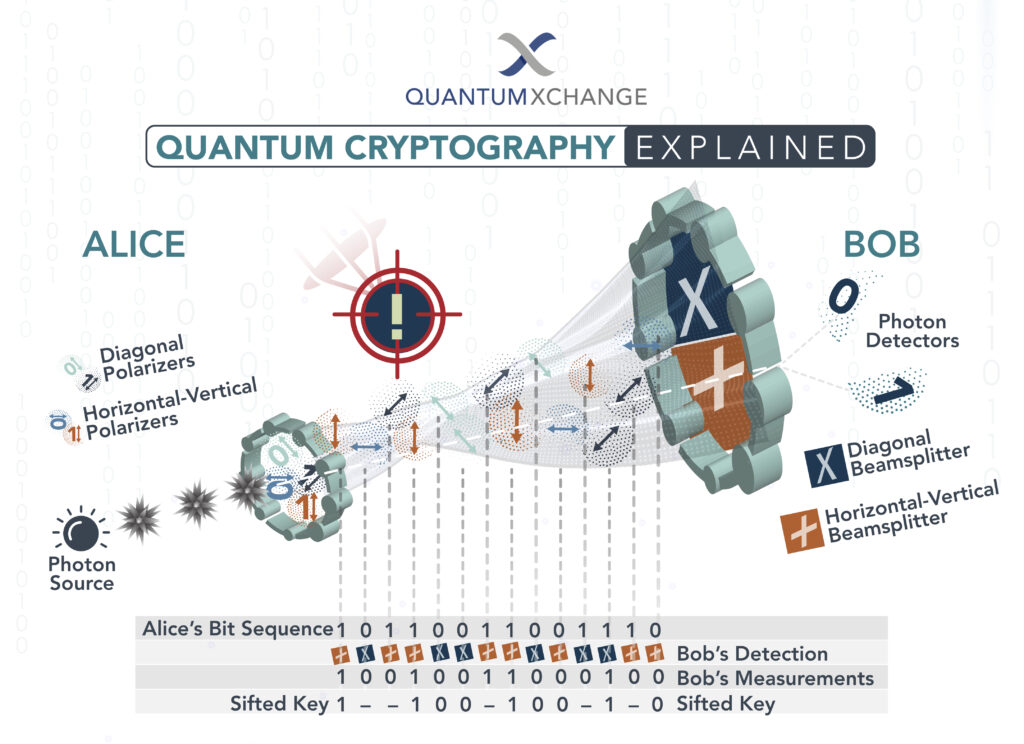Quantum cryptography is a revolutionary new technology that has the potential to completely transform the world we live in. In the past, cryptography has relied on mathematical algorithms to protect sensitive information, but these methods are vulnerable to being hacked by increasingly sophisticated cyber criminals. Quantum cryptography, on the other hand, uses quantum mechanics to create unbreakable codes that are impervious to all known forms of attack.
The implications of this breakthrough are enormous. With quantum cryptography, businesses and governments can securely transmit confidential information over the internet, without fear of interception or theft. This could lead to a whole new era of innovation and productivity, as companies are able to share information without worrying about the risk of data breaches. Additionally, quantum cryptography could also be used to protect critical infrastructure, such as power grids and transportation systems, from cyber attacks, making our world a safer and more secure place.
Quantum cryptography is set to revolutionize the world of data security by allowing the secure transmission of data without the risk of interception. This is done through the use of quantum key distribution, which is a way of encoding data using quantum states. Quantum cryptography is expected to have a major impact on both the military and commercial sectors, as it allows for secure communication without the risk of interception by a third party.
Quantum cryptography is also expected to have a major impact on banking and finance, as it will allow for secure transactions without the risk of fraud. This technology also has the potential to make the internet safer, as it will allow for secure data transmission without the risk of interception. Finally, quantum cryptography could also help to reduce cyber-crime, as it will make it more difficult for hackers to access confidential information.

What is Quantum Cryptography?
Quantum cryptography is an emerging technology that offers an unprecedented level of security by using principles of quantum mechanics to encrypt and secure data. Quantum cryptography uses quantum bits (or qubits) to encode and send data, making it virtually impossible to break the code. This makes it the most secure form of cryptography available today, and it could revolutionize the way data is stored and transmitted.
Quantum cryptography works by using the properties of quantum mechanics to create a secure communication channel. It relies on the Heisenberg Uncertainty Principle, which states that it is impossible to know both the exact position and momentum of a particle at the same time. This principle is used to generate secure keys, or codes, that cannot be replicated or guessed. The key is then used to encrypt the data, making it virtually impossible to access without the proper key.
How Will Quantum Cryptography Change the World?
Quantum cryptography has the potential to revolutionize the way we communicate, store, and protect our data. The incredible security offered by quantum cryptography makes it the ideal choice for any data-sensitive application, such as banking, government communications, and military operations.
Quantum cryptography could also be used to protect personal data and communications, such as emails and text messages, making it nearly impossible for hackers to access this information. This could dramatically reduce the number of cyber-attacks, as well as the damage they cause.
Quantum cryptography could also be used to create ultra-secure networks, allowing for the transmission of large amounts of data without any risk of interception or manipulation. This could enable the development of new technologies, such as self-driving cars, that require large amounts of data to be securely transmitted.
Finally, quantum cryptography could be used to create unbreakable encryption algorithms. This could be used to protect data from malicious actors, such as nation-states, and ensure that only authorized users can access sensitive information.
Conclusion
Quantum cryptography is an emerging technology that has the potential to revolutionize the way we communicate, store, and protect our data. It is secure, reliable, and could enable the development of new technologies that require large amounts of data to be securely transmitted. It could also be used to create unbreakable encryption algorithms, ensuring that only authorized users can access sensitive information. Quantum cryptography could be the key to a more secure and protected future.
Frequently Asked Questions
Quantum cryptography is an emerging technology with the potential to revolutionize the security of communication networks. This article explores how quantum cryptography works, the potential impact it will have on the world, and the challenges that still need to be addressed.
What is Quantum Cryptography?
Quantum cryptography is a branch of cryptography that uses the principles of quantum mechanics to secure communications. It is based on the fact that certain properties of a quantum system, such as its polarization or spin, cannot be measured without disturbing the system. This means that a sender and receiver can communicate securely without the risk of their messages being intercepted. Quantum cryptography also has the potential to provide secure authentication and key exchange, making it an attractive option for businesses and governments.
How Will Quantum Cryptography Change the World?
The potential impact of quantum cryptography on the world is immense. It promises to revolutionize the security of our digital communications, making it virtually impossible for hackers or other malicious actors to intercept and decode sensitive information. It also has the potential to make financial transactions more secure, and to improve the security of voting systems. In addition, quantum cryptography could be used to protect the privacy of individuals, allowing them to communicate securely without fear of their data being intercepted.
What Challenges Need to be Addressed with Quantum Cryptography?
Despite its promise, quantum cryptography is still in its early stages and there are a number of challenges that need to be addressed. For example, quantum key distribution requires a secure quantum channel, which is difficult to achieve in practice. In addition, quantum computers will be needed to process the quantum keys, and these are still in development. Finally, quantum cryptography is also vulnerable to side-channel attacks, meaning that attackers can gain access to sensitive information by monitoring the communications channel.
What is the Difference Between Quantum Cryptography and Traditional Cryptography?
The main difference between quantum cryptography and traditional cryptography is the way in which the data is encrypted. In traditional cryptography, data is encrypted using algorithms and mathematical formulas. In quantum cryptography, the data is encrypted using the principles of quantum mechanics. This means that the data is encrypted at a much deeper level, making it virtually impossible for attackers to decode it.
Is Quantum Cryptography Secure?
Yes, quantum cryptography is generally considered to be secure. The main advantage of quantum cryptography is that it is theoretically unbreakable, as the laws of quantum mechanics make it impossible to measure the state of the system without disturbing it. However, it is important to note that quantum cryptography is still in its early stages and there are a number of challenges that need to be addressed before it can be widely adopted.

In conclusion, quantum cryptography is set to revolutionize the world in ways we can hardly imagine. The technology has the potential to completely transform the way we communicate and protect sensitive data, making it more secure and immune to hacking attempts. With quantum cryptography, we can finally say goodbye to the vulnerabilities of traditional encryption methods and welcome a new era of secure communication.
However, like any other technology, quantum cryptography also has its limitations and challenges. The high cost of implementing this technology, coupled with the need for specialized hardware and expertise, may hinder its widespread adoption. Additionally, quantum cryptography is still in its nascent stages, and many researchers are working hard to resolve the technical challenges that come with it. Nonetheless, the future of quantum cryptography looks bright, and we can expect to see more innovative solutions emerge in the coming years.

